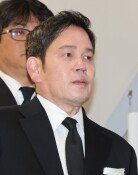Pres. Moon calls for Japan to return to diplomatic resolutions
Pres. Moon calls for Japan to return to diplomatic resolutions
Posted July. 16, 2019 07:49,
Updated July. 16, 2019 07:49
“I warn that Japan will suffer more damage from export curbs,” South Korean President Moon Jae-in said in regards to Japan’s export controls during a meeting with senior presidential aides on Monday. "I hope the Japanese government will retract its unilateral pressure and return to the stage of a diplomatic resolution," he added. This was the third public message of President Moon to Japan following the ones on July 8 and 10. It is his two-track strategy of adopting a firmer stance by using the word “warn” while keeping the door for a diplomatic negotiation open as Tokyo remains unmoved.
This week will be a watershed moment for the tension between Korea and Japan. The coming Thursday is the deadline set by the Japanese government for a third-party arbitration panel for the South Korean Supreme Court’s ruling on compensations for the Korean victims of Japanese forced labor. Tokyo has warned that South Korea will be removed from the “white list,” a list of priority countries for export. If the second round of export curbs is initiated, the conflict between the two neighboring countries may last for a long time.
“If practical discussions are possible, any type of meeting will be accepted for a broader good,” Hwang Kyo-ahn, chairman of the Liberty Korea Party, said during a press conference on Monday amid the continued tension between the two countries. President Moon also positively responded, calling for nonpartisan cooperation in the political circles. Of course, Chairman Hwang set the replacement of officials in charge of diplomatic and security matters as a precondition to meet with the presidential office Cheong Wa Dae, but a meeting between the president and the leaders of the five political parties at Cheong Wa Dae has become more likely.
Non-partisan cooperation is an absolute must in dealing with Japan’s export regulations. Now is a time to speak with one voice for national interests, regardless of political parties. The united voice of the ruling and opposition parties, the government, and Korean businesses could serve as diplomatic leverage to put pressure on the Japanese government. Once the Cheong Wa Dae meeting takes place, other efforts to initiate negotiations are needed by fully utilizing the parliamentarian diplomacy channel, such as the South Korea-Japan Parliamentarians’ Union, which has remained dormant for a while.
The presidential office should also actively listen to the voice of the opposition parties. Although it is clear that the Japanese government was the primary reason for the current situation by taking economic retaliation measures in violation of the principles of free trade, it is necessary to reflect on whether the South Korean government’s response was appropriate. Presidential advisors’ recent mentioning of the National Debt Payment Movement and the Donghak Peasant Revolution must be avoided as it only makes a diplomatic negotiation more challenging. The Liberty Korea Party may criticize the government’s incompetence but must keep in mind that it could be adversely used by Japan. Both ruling and opposition parties must refrain from acting based off of shallow political interests faced with an issue of huge magnitude that can determine the future of the nation to avoid any irreversible damage.
Headline News
- Joint investigation headquarters asks Yoon to appear at the investigation office
- KDIC colonel: Cable ties and hoods to control NEC staff were prepared
- Results of real estate development diverged by accessibility to Gangnam
- New budget proposal reflecting Trump’s demand rejected
- Son Heung-min scores winning corner kick







